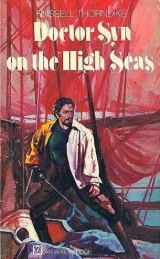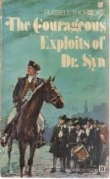
Текст книги "Doctor Syn on the High Seas"
Автор книги: Russell Thorndike
Жанр:
Исторические приключения
сообщить о нарушении
Текущая страница: 2 (всего у книги 14 страниц)
Chapter 2
Doctor Syn Becomes a Squire of Dames
Sir Henry Pembury received his young clerical visitor in the Great
Hall of the Castle. He apologized for not rising to greet him by
pointing to his right foot, which, heavily bandaged, rested upon a stool
in front of the large armchair in which he sat.
“I must ask your pardon also for having put you to the trouble of
climbing Lympne Hill, but, you see, Doctor Syn, since this mountain of
gout could not go to Mahomet, I had to ask you to come to me instead.
Also the nature of the request I have to put to you makes it more
convenient for you to be here, s o that you may see with your own eyes of
what you are letting yourself in for. But first may I ask you when you
think of journeying back to Oxford?”
“A week today, sir,” replied Doctor Syn.
“And how did you propse to get there?” went on Sir Henry. “By the
stagecoach or private conveyance?”
– 10 -
“By neither, sir,” returned the Doctor. “I ride there on horseback,
and I am glad to say that my good friend Tony Cobtree is to ride with
me.”
“But I understand from Sir Charles that his son had finished with the
University.”
“So he has, sir. More than a year since. He is revisiting the town
on a more romantic mission than book -learning. He is taking a proposal
of marriage to the lady of his affections.”
“That’s capital!” cried the Squire of Lympne heartily, as, without
thinking, he brought his hand crashing down on to his bad leg. That
caused him such excruciating pain that it was some time before he could
continue speaking.
In the meantime Doctor Syn expressed his sympathy by saying that he
was surprised that so young a man as Sir Henry should be plagued with an
old man’s disease.
“Aye,” replied the other, as he slowly recovered. “I’m still just on
the right side of fifty, but I’m running to fat, and refuse to give up
my two bottles of port for the whole faculty of doctors. My tailor
could as easily persuade me to wear an a ill -fitting coat. But to return
to this Oxford business. You may or may not be aware that I undertook
recently a Government mission to Spain. While in Madrid, my wife and I
were lavishly entertained by a wealthy South American family. We
naturally extended to them the hospitality of Lympne Castle if by any
lucky chance they visited England. It has proved, however, a most
unlucky chance that has brought them here. The father died suddenly,
and the mother and daughter are now travelling to deaden their grief.
In short, they have been with us here for the last fortnight. Lady
Pembury is very attached to them both, and wished them to stay
indefinitely, but it so happens that they have to trasact some business
with a gentleman of Oxford concerning a mutal property in Spain, and
since the roads are none too safe for foreign ladies travelling alone, I
wonder now whether you and young Cobtree will undertake to be Squires of
Dames and ride as their escort, since you are also bound for Oxford?”
“For myself, sir, it will be an honour,” replied Doctor Syn, “and I
know I can say the same for Tony.”
Sir Henry leaned forward and whispered. “You will not regret it.
The widow is beautiful, but the daughter is ravishing. The mere fact
that young Cobtree has already given his heart to a girl in Oxford will
give you a clear field with the young beauty.”
Doctor Syn smiled. “I had no idea you were a matchmaker, sir.”
Sir Henry winked. “You wait till you see her, my lad,” he laughed.
But then his face went grave and he shook his head. “Ah, no, of course
not. I had forgotten your cloth.”
“There is nothing against a parson marrying, sir,” said Syn.
“Like enough,” returned the other, “but everything against an English
parson wedding a Spanish Catholic, I should say.”
“Well, that question need hardly trouble us, sir,” smiled the Doctor,
“for I have not yet seen the lady, much less fallen in love with her,
and even though I did, ‘tis ten to one that the lady might not fall in
love with me.”
“I think there is no need for you to mortify yourself,” said the
Squire. “You seem to me to be a young gentleman who will always get
what he wants in this world.”
“I hope you are a true prophet, upon my soul, sir,” replied
Syn. As he looked up the door opened and she was standing
there, like a fresh painting set in the old oak paneling. The
young scholar gasped in wonder, and slowly rose to his feet. He
knew that he was gazing at
– 11 -
what he wanted more than all the world.
She was dressed simply in the black mourning for her father, with a
priceless mantilla crowned high and falling in cascades of lacy folds.
The only aloofness of the young scholar is his black riding dress had
arrested her in the same bewildered astonishment. They forgot the
presence of Sir Henry, who, secretly amused, was the first to break the
spell.
“Senorita, “he called, “let me present to you my good young friend
Christopher Syn, a learned Doctor of Oxford. Doctor Syn, this is Miss
Imogene Almago, of whom we were but now talking.”
The Doctor was the first to move. He crossed the room with long,
easy strides. The girl watched his approach, and smiled when he bent
over her hand and raised it gently to his lips.
“I should add to my introduction,” went on Sir Henry, “that this
gentleman is to be your escort when you leave our county for
Oxfordshire.”
“I am greatly honoured,” said Doctor Syn in a voice that was low, yet
clear and caressing.
“Bring the senorita to a chair over here,” said Sir Henry. “And I
shall delight in seeing you two the better acquainted.”
Then Doctor Syn heard Imogene speak for the first time, in a voice
mellow with the richness of the South. Her English was perhaps slow and
a trifle stilted, but King’s English for all that.
“I was sent by Her Ladyship to ask you, Sir Henry, whether there was
aught you needed before we take our usual walk round the improvements on
the Castle grounds. They await me with the flower baskets upon the
terrace, where the peacocks walk.”
“Then take Doctor Syn with you, child, and become the better
acquainted yourselves, or with Lady Pembury’s help,” replied Sir Henry.
“But is there aught you can do for me, you say? Aye, there is. Two
requests to one man. Summon that rascally old butler of mine and tell
him that Sir Henry would take the physic ordered him by the Doctor
Sennacherib Pepper. It is, tell him, a full flagon of sherry sack, and
in it, my dear young friends, I shall drink to your good healths. I am
sure, too, Senorita, that you will remember enough of our English to
inform him that Doctor Syn, your escort here, is consenting to stay with
us for dinner.”
Doctor Syn bowed his thanks to the Squire of Lympne, saying, “I am
neither impertinent enough nor so stupid as to disobey your orders,
sir.” Then, turning to the girl and offering her his arm, added, “May I
help you, Senorita, to find the butler and deliver Sir Henry’s
commands?”
The young Doc tor, knowing the Castle well, escorted his beautiful
charge on air to the pantries, where he delivered the Squire’s messages.
He then took pains to take a roundabout way to the terrace, finding, to
his great relief, that Lady Pembury and the Spanish widow had left it
solitary but for the peacocks.
Imogene, who, owing to her father’s death and the strangeness of a
foreign land, had been considered reserved and shy, found herself
talking more freely than she had though possible to this young scholar.
And Doctor Syn, who had been so often rallied by his friend Tony for not
attempting a success amongst the ladies, realized that in this young
girl was a cure for all his shyness and aloofness. He knew also that in
her companionship he could be more than comp ensated for the loss of
parents and relatives that had forced his young life into a loneliness
that was unnatural.
Now, like all good Marshmen, Doctor Syn had been bred to understand
their natural enemy, the sea: the sea which angrily waited to destroy
the great
– 12 -
seawall which kept their pastures safe. He was a fine swimmer, and
knew something of sail, of tides and winds. But he confessed afterwards
to Tony Cobtree that he had never been so proud of his skill in
navigation as he was that morning in successfully avoiding a meeting in
the wide grounds of Lympne with Lady Pembury and the girl’s mother. No
sooner did he descry them in the distance than he tacked away on another
course which kept himself and his consort on a uninterrupted steering.
Therefore, by the time he exchanged greetings with the elder ladies on
their return to the Castle, the two young people had learned a good deal
about each other.
Having spent many happy years at the University, and knowing the
best families in the district, Doctor Syn was naturally interested to
know what house they were visiting in Oxford. The daughter, who spoke
English more fluently than her mother, explained that they were bound to
Iffley, on the outskirts of the town, and were to reside there with the
Squire until such time as certain business connected with her father’s
will could be settled. The Squire’s nephew, on Nicholas Tappitt, had
secured an important position under the British Ambassador at Madrid.
Through some unfair treatment, as the girl pointed out sympathetically,
the young man had lost his post, and having a liking for Spain as well
as for the sea, he had enlisted the influence of Senor Almago, who
provided him with a ship in which to carry his own fruit -produce to
England and the Netherlands. In this way Nicholas, for whom they seemed
to have a liking, was able to remain in Spain in spite of his lost
position. “My dear father believed in Nicholas,” said the girl. “And
whatever the trouble many have been at the Embassy, we w ere all
convinced that Nicholas was not to blame.”
Doctor Syn, knowing something of the said Nicholas, though otherwise,
for this plausible young rascal had been sent down from his college
owing to an unsavory scandal connected with a serving-wrench. H e kept
his opinion, though allowing himself to consider Imogene’s fine sympathy
wasted on such a rapscallion.
Hearing that Doctor Syn was acquainted with Squire Tappitt, the
Spanish ladies pressed him for information concerning him and the Iffley
estate. Here the young Doctor found himself in an awkward dilemma, for
certainly what he knew of the uncle was a good deal more unpalatable
than his knowledge of the nephew, for, known as Bully Tappitt, the
Iffley Squire was shunned by all God -fearing people in the
neighbourhood. Coarse, and brutally strong, with the worst reputation
where women were concerned, he was the last man Doctor Syn would have
wished to play the host towards his new-found friend and already adored
Imogene. So he answered all their questions concerning Iffley and the
Squire as evasively as possible, inwardly rejoicing that he was to be
their escort, and determined that they should transact any necessary
business with the Squire of Iffley from some quiet lodgings in the town,
where he and Tony could keep protective watch.
During dinner, set out on a round table, where Doctor Syn sat between
Lady Pembury and the Spanish girl, the latter talked so much about
Nicholas that the young cleric for the first time in his life suffered
the worst pangs of jealousy. She afforded him the acutest agony as she
recounted the many churches, parties and theatres to which the rascal
has escorted her. She told him how very fond she was of him, how vastly
he amused her with his funny ways, how much she admired his adventurous
spirit in becoming a businessman after his forced failure as a diplomat.
“But I loved him best,” she said—“oh yes, very much indeed—when he
told me he was desperately in love with me, but even better still when
he most solemnly asked me to marry him.”
– 13 -
With his spirits at the lowest ebb, Doctor Syn managed to ask her, “And
what did you answer?”
“I?” she whispered. “Why, I laughed in his face. I told him that my
very life would be in danger from all the other women he had put the
same question to that very day. And it is true. He has a way with him.
But oh, too reckless! They say that when he goes up to woo a lady in
her drawing-room, he will make proposals to the serving-maid upon the
stairs. He is a rake, m y dear sir.”
“I admit he was when I knew him,” returned Syn. “And so neither of
you took the proposal very seriously, I take it?” he added, with his
heart much lighter.
“He did,” she laughed. “At one time he was so serious in his
protestations that he ran out of our house to the nearest church,
embraced the Catholic Faith, and was surprised that such devotion did
not sway me. But how could I marry a man who would forget the fact
whenever he saw another petticoat in view?”
“Also you would not think of marrying a fool,” whispered Doctor Syn.
“And the man who, having once seen you, could think of another woman
would prove himself the worst of fools, in my thinking.”
“That is very kindly put,” she answered. “But, do you know, I think
that you are even quicker than poor Nicholas in saying the pretty
thing.”
“But I have never said a pretty thing to a lady before in all my
life,” he replied. “And except to you, I never shall. From the first
moment I saw you in the doorway, I knew well that I love d you. I do
love you, and for me there will be no other woman.”
“Then may I ask you a favour—a great favour?” she whispered.
“I will do anything for you,” he whispered back. “What is it?”
“That you will tell me that again when we are alone beneath the
stars? Will you?”
“When? Soon?”
“I hope so, “ she breathed back gently.
Now it was easier than might be imagined for these two young lovers
to whisper about such intimate things. First the girl’s mother, who sat
directly opposite, was slow to understand English, and both her host and
hostess had moved their chairs as close to hers as possible, so that
they could speak the plainer in her ears. Also Sir Henry, who was
secretly enjoying this ripening love affair, tactfully moved a large
bowl of flowers, which screened their faces into a comparative privacy,
and of this Doctor Syn certainly made the best advantage, for just
before Lady Pembury suggested that they should retire to the drawing room and leave the gentlemen to their port, he had taken Imogene’s hand
in his beneath the table, had felt an answering pressure to his own, and
then seen, to his utmost joy, her lips frame silently the words, “I love
you too.”
Then, owing to Sir Henry’s gout, he claimed the privilege of
escorting the ladies to the door, and since the girl was last to leave,
he managed to whisper without the butler hearing, “Upon the terrace.
Soon. Beneath the stars.”
And the look she gave him was assent.
All very romantic, and cleverly done. But Doctor Syn had really no
cause to think, as he did, that he had deceived not only Sir Henry, but
the butler; for as he gazed after the girl until she disappeared into
the drawing-room,
Sir Henry was guilty of bestowing a solemn wink upon the ancient and
stately man-servant, who respectfully and solemnly returned the wink to
his master.
– 14 -
But of this Doctor Syn was ignorant, as he returned to the table and,
picking up his glass, toasted “All beneath the roof of Lympne Castle.”
“Sit down here, Doctor,” said the Squire of Lympne. “I told you that
you seemed to be the sort of young man who can get what he wants, and I
am most eager to help you.”
“That is very good of you, sir,” replied Doctor Syn, with a smile of
gratitude.
“I suggest,” continued Sir Henry, “that I despatch one of my stablemen down to Dymchurch with a note from me to say that you are staying
the night with us here, for it has occurred to me that the evenings
being still long, the stars may be plaguey late coming out upon the
terrace.”
“Faith, sir,” laughed the Doctor, “either I talk too loud, or your
hearing is very acute.”
“Or your speaking is always clear, even in whisperings,” said Sir
Henry. “But listen to my further suggestions, and see if they commend
themselves to you. Tomorrow you will escort the lady and her Spanish
companions to Dymchurch, and make them acquainted with our good friends,
the Cobtrees. Sir Charles, being your guardian, will no doubt be glad
of the opportunity of looking well upon the face and person of the
Senorita, for I may drop such a hint to him in my letter. I then
suggest that while he talks with our Spanish ladies, you take the
opportunity of packing up your traps and having them put into the boot
of my coach. I then suggest that you persuade the Cobtrees how very
essential it is for you to return to Lympne and finish your vacation
with us. Young Cobtree will certainly excuse you, since he must be in
the same frame of mind which your visit to Lympne has framed you in too.
My further suggestion is that, since the Senorita is a keen horsewoman,
and owing to the fact that your whisperings inside the coach might be
too clear, you two shall ride behind the coach at a distance sufficient
to avoid the dust of the wheels. I mention the back of the coach in
order that my good coachman shall have nothing to distract his attention
from the horses before him. And now, if you are in agreement, bring me
those writing materials, and I will pen the letter on the table here.
But let me first recharge our glasses, and drink to Doctor Syn, and one
other that shall be nameless.”
“And to our kind host,” replied the Doctor.
“And since I like to be undisturbed when toiling with the pen,” went
on Sir Henry, “I suggest that when you have helped me finish this
bottle, you rejoin the ladies in the drawing -room.”
Before carrying out this last suggestion, Doctor Syn unfolded his
anxiety concerning the Squire of Iffley, telling Sir Henry in confidence
all that he knew of the uncle and the nephew.
To this, Sir Henry listened gravely, and then asked, “How long is it
since you visited these Tappitt people, then?”
“For nearly a year I have avoided Iffley,” replied Syn. “I formed
the opinion they were not the sort of people with whom a
clerical official of my college should be associated. I have too many
young and impressionable youths under my charge, and have to set them an
example. Warning them against such rakes as the Tappitts, I had in all
honesty to take the warning to myself.”
“And have you heard nothing of the uncle since?” asked Sir Henry.
“Nothing to his credit, believe me, sir.”
“You tell me that he had a bad reputation where women are concerned,”
went on Sir Henry. “But when you knew him, he was a bachelor, I
understand.”
“He certainly had no wife to insult with the presence of the many
questionable ladies that resorted there.”
– 15 -
“Then, since a woman can so often change a man for the better,” said
Sir Henry, “perhaps even Bully Tappitt has mend his ways. I have a
letter here that you may read. The Senora had another couched in the
same terms. As you see, this is addressed to Lady Pembury and myself,
telling us what a pleasure it will be to receive our Spanish guests, and
asking when they may expect them. It is signed, as you see, by Elinor
Tappitt, wife to the Squire of Iffley.”
Saying which, he handed the parson a letter which he took from his
pocket.
Doctor Syn read the letter through, and then glanced up at Sir Henry.
“Well, sir,” he said, “at the risk of seeming suspicious and perhaps
uncharitable, I believe this letter to be false.
“The Squire of Iffley thinks, quite rightly, that if our Spanish
ladies realize he is a bachelor and has no wife to welcome and protect
them, they would decline to sojourn under his roof. This would not suit
Bully Tappitt. He needs money for his gaming, and if he can get our
friends into his power he will do what he likes with their money. Now,
I know a landlady in Oxford of the strictest integrity, where our
friends could be lodged most comfortable, and I suggest, sir, in my
turn, that we shall be fortunate in having Tony Cobtree in our company,
for since he has already been called to the Bar, his advice on any
document that may be presented to the ladies for signature will be of
the greatest help.”
“And the very nature of his journey will keep him in Oxford some
time, no doubt,” laughed Sir Henry. “Well, my lad, since you are to be
the ladies’ escort, this Squire of Iffley be contemplating any rascally
tricks, I warrant you and young Cobtree will be more than a match for
him.”
“I hope we may be, sir,” replied Doctor Syn. “For my part, I shall
depart from the usual custom of my cloth and buckle on my father’s
sword.”
“But however brave your steel,” cautioned Sir Henry, “see that it is
tempered with good caution, for to make enmity with a noted duelist is
no light undertaking.”
“At the worst, sir, I should not be unprepared,” replied the Doctor,
“for since taking orders I have never given up the practice of many
accomplishments. In riding, fence and marksmanship I have been in
continual training, and with right upon my side and a reasonable amount
of luck, backed by mine own skill, I have yet to meet a man whom in a
righteous quarrel I should avoid.”
“And since Christ in Holy Writ that He brought a sword to the Earth,
I fail to see why His own parsons should be scorned to be skilled in
‘em,” said the Squire of Lympne solemnly.
After which understanding between these two gentlemen, Doctor Syn
went to join the ladies.
And long after the Squire of Lympne had despatched his rider with the
letter for Sir Charles Cobtree upon Romney Marsh, the early night stars
played their romantic parts upon the terrace of the Castle, so that when
a last good-nights were said in the corridors of Lympne, Doctor Syn was
confident that his authority with the Spanish ladies went a little
further than mere escort, for Imogene gave him cause to believe that
their families were almost united. Certain it was that Doctor Syn
desired no better.
The n ext day the faithful coachman to Sir Henry reported to his
master that the expedition to Dymchurch-under-the-Wall was a great
success. His “Everything -seems-very-promising-your-Honour” was
optimistic news to Sir Henry, and it did the coachman no harm in
reporting it, for Sir Henry, despite his gout, was still romantically
inclined, and happened to be fond of both his young Spanish guest and
the brilliant nephew of his own attorney Solomon Syn.
– 16 -
Imogene loved Dymchurch, and all the good folks she met there. Sir
Charles Cobtree went out of his way to make the place seem attractive to
her.
“Persuade young Christopher to marry, my dear, and then tell him to
leave Oxford and retire here as our Vicar. The people need a married
parson here. Our pr esent incumbent wishes to retire. Well, he is old,
I’ll admit. But I’ve badgered the old fellow to stay on till my good
young friend is ready to take his place. Let him bring Dymchurch a
Vicar’s wife, and the living’s his.”
“I love it all, my Christopher,” she whispered on the ride back to
Lympne beneath the stars, “But oh, my dear, your little churches, and
your great ones too, of the Protestant Faith are so very plain and dull
compared with the glories of ours. But I love you, dear. Yes, I put
you before religion.”
“But could you change your faith for mine?” asked the parson.
“Oh, but I could do more for you than ever the stupid poor dear
headstrong Nicholas did for me,” she answered. “If he could change his
faith for mine because of love, cannot my love
make me change mine too, because I happen so to think of you? My church
is now you, and my faith and ritual is my love for you. Do you love me
as well?”
“I think I would give up all for you,” he answered. “But you could
never ask me to give up faith and honour. You also could never give up
honour, and I do not ask you to give up your own country’s faith.”
“But I shall, and of my own free will; and yes, because of you. But
you must still allow me to think that the churches of the Pr otestants
are, oh, so dull!”
“Your presence in them will make them the more lively,” he smiles
back.
But that speech of hers he was destined to remember through the
twenty years’ Odyssey of bitterness.
However, there was no thought of bitterness d uring the blessed week,
so skillfully prepared by the Squire of Lympne, and certainly no
bitterness in that long ride beside the coach to Oxford. A face at the
coach window. A beloved rider outside. A loyal companion in the
handsome Tony Cobtree, who lingered for his friend’s sake, although so
impatient to reach their goal for his own ends. A long, romantic
journey, and no mishap to mar it. But everything to make it wonderful.
Romance and Love. Until at last Doctor Syn rides out to Iffley to inform
the Squire that his betrothed, one Imogene Almago, and her mother are
awaiting to receive him in their lodgings at Oxford, and that their
attorney will be there at his convenience any morning to discuss
business.








